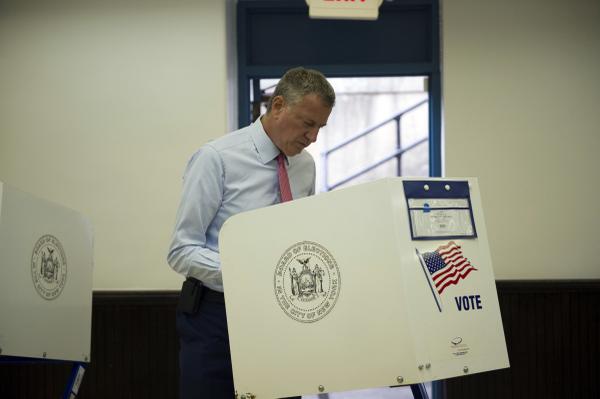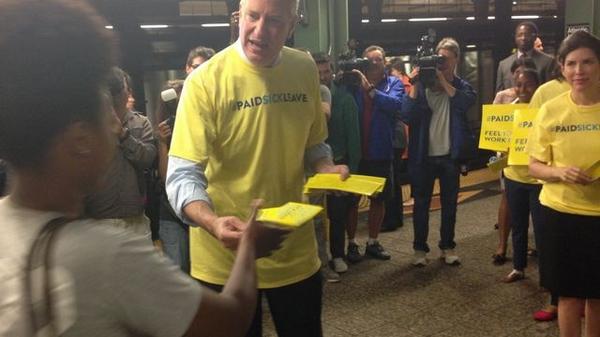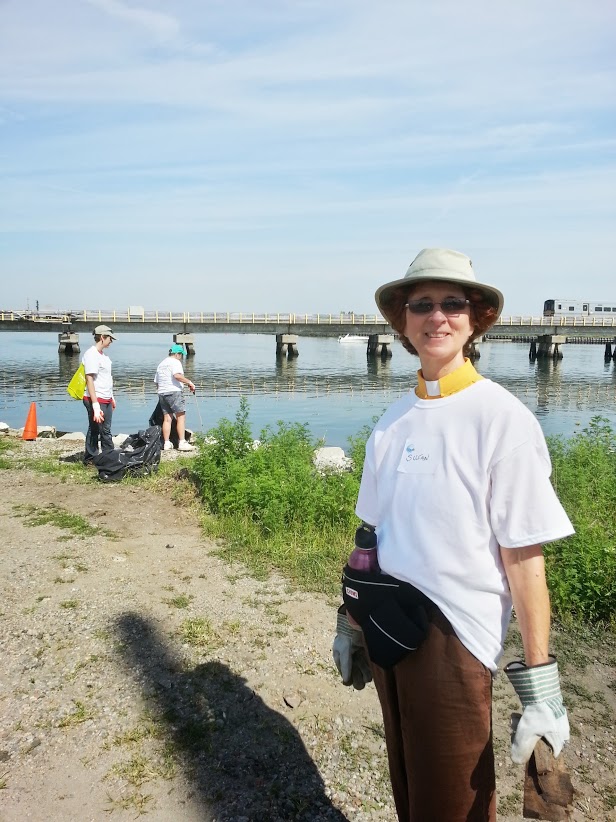Solving Our Voter Turnout Crisis

Mayor de Blasio casting his vote on primary day (photo: @BilldeBlasio)
Last week's Democratic gubernatorial primary saw shockingly low turnout among New York voters - less than 10% of the state's 5.8 million registered Democrats cast a ballot.
Except no one is shocked.
The latest sign of distress in our democracy didn't turn many heads because it was expected; another plot point on a downward sloping trend line, both here in New York and nationally. Our voter turnout crisis is very real and should be troubling to anyone who cares about democracy, responsible government, and good public policy.
A primary day tweet from the account of Mayor Bill de Blasio reads, "Do your civic duty, New York City-vote today," above a picture of the mayor at his polling place. Reminders like this from the mayor and many other civic leaders have no effect, of course, as people have virtually all made up their minds about voting before the day arrives - especially on a day like last Tuesday with state-level primary elections in a non-presidential year. Sadly, an increasing number of potential voters are opting not to perform their "duty."
But who cares? We do not question the legitimacy of our governments, even if they are elected by a smaller and smaller percentage of constituents. Non-voters are adults, people who understand at least the general concepts of democracy, voting, and government. To boot, when we talk about voter turnout, we typically use stats based on registered, not eligible voters (estimates are that in the U.S. a little over 70% of eligible voters are registered).
Those who decide not to participate, for whatever reasons, are ceding power to those who care, those who organize and fight for their interests. Non-voters give tacit approval of whatever outcomes result; providing their proxy to the voters who opt in.
I, for one, don't want an increasingly diminishing portion of the potential electorate to decide the outcomes of our elections and therefore, much of our public policy. But, I also don't want even more uninformed voters heading to the ballot box to simply fill in an oval next to the name they recognize most from TV ads or mailers.
I want a flourishing democracy.
There are all sorts of election-related reforms that can and probably should be enacted, of course, and if you're reading this article you might very well already be able to list them: same-day registration; open primaries; term limits; and greater campaign finance regulations, among others. But, there's another essential element: education.
We've become scared of politicizing the classroom. By and large, we don't teach current events - which we should be doing in every subject area, not just social studies, where it happens at times. For the most part, we aren't infusing real-world issues and experiences into coursework, even in college.
We aren't exposing our children to civic thinking from a young age.
Just like we should (but don't) immerse our students in the study of foreign language from a young age, we should immerse them in the study of public life. We should invite our students to think critically about the world around them, we should invite debate. We should provide opportunity for authentic experiences and community service learning and action civics. We should allow young people to help make public policy.
We need a generational shift. It won't happen overnight, but it can happen.
This shift will take a reimagining of our schools, of our classrooms and our curriculums. It will take a retraining of our teachers and our after-school program providers. But, like with just about everything we should scale up, we have enough people doing things the way I'm describing that we can get there in due time. Positive shifts in focus from teacher-centered to student-centered classrooms and the increased honus on critical thinking skills are part of the equation.
As New York State and municipalities therein adapt to the common core standards and revamp both curriculum and instruction toward meeting them, there is a perfect opportunity to make more changes. The best outcome won't even be increased voter participation, it will be that virtually everyone involved enjoys school more and gets more out of it because it is a place of relevant, real-world thinking and action.
Voters and non-voters alike have little faith in elected officials to be honest and effective, but are generally not thoughtful about solving this problem. Instead, people disengage - or stay disengaged or withdraw further. To change that and ensure a social norm of critical thinking about public life and policy, we must establish this m.o., making it a part of who we are and what we do: in the classroom, at the dinner table, everywhere.
Many of the adults who care about politics and government were the kids who cared about politics and government. These people are the exception. To make them - us - the rule, we must encourage engagement from a young age.
Even in today's school culture, when you ask young people about problems with the world around them and for ways to do things differently, the floodgates open.
Yet, we don't often ask those questions and therefore, when the gates to the polling place are flung wide, there is not a flood of voters, but a trickle.
***
by Ben Max, executive editor, Gotham Gazette
@TweetBenMax
Small Business Cost & Regulatory Hurdles in New York City

Mayor de Blasio promotes paid sick leave (photo: @NYCDCA)
The following entry is part of The Small Business Corner, a collaboration between Gotham Gazette and GoBizNYC:
We seldom hear small business owners weigh in on the public policy issues that impact their ability to hire and grow in New York City, partly because they are busy earning a living and partly out of their fear of getting embroiled in politics that could impact their customer and regulatory relationships. The following is a telling interview with Rachel, an entrepreneur who asked us not to use her last name, but whose story reflects the experience of neighborhood businesses throughout the five boroughs.
Why did you decide to start a business in NYC?
I grew up in NYC and have chosen to raise my family here. This is the best city in the world and, after over a decade as a retail executive in Corporate America, I decided to open up a retail children's store in the neighborhood where I grew up. Children's retail is a great business and there is nothing better than making a child smile.
What have been unexpected challenges you've faced?
I have been surprised by the number of hurdles you face when trying to open a business in NYC. For example, I hunted for weeks to find an "affordable" space. I found a great location for about $16,500 per month, but with all my fixed costs, I need to do over $700,000 in sales annually just to break even. That is simply a bucketload of merchandise that I need to sell each year and makes me charge prices that are higher than I would like.
Then you get to taxes and realize the situation is even worse. When deciding how to structure my business, I was leaning toward registering as an S Corp, since this typically provides tax and legal advantages compared to registering as a Limited Liability Corporation (LLC). But then I found out that NYC does not recognize S Corps, subjecting them to an 8.85% General Corporation Tax. So I said, 'Okay, I will become an LLC instead.' I then discovered that LLCs are subject to a 4% Unincorporated Business Tax (UBT) in NYC, with Medicare and Social Security taxes on top of that. So you get hit hard no matter which structure you choose. There is a tax credit available for small businesses that pay the UBT, but only those that do under $150,000. If I do that volume, I would need to shut my doors.
Lastly, there are many local mandates that have been passed that are going to burden small businesses even more and hurt employees at the same time. Quite frankly, if I didn't love NYC and wasn't raising a family here, I definitely would not be opening up here. I could go across the river to Hoboken and launch the exact same concept with a fraction of the costs and hassles.
Can you give an example of the impact of City regulations on small business?
The NYC Paid Sick Leave Law is something I have been learning about and trying to navigate. This law has great intentions – to make sure that each employee gets paid sick leave, if needed. I believe that this is the right thing to do and that employees should not be penalized if they are legitimately sick. But this law is unduly onerous to small employers. Given the fact that an employer has to pay for staff coverage while also paying for an employee who is out sick, even if you have just 5 full-time employees, your costs still increase by thousands of dollars each year.
This law also has unintended negative consequences on employees. I have found that employers are now very reluctant to give any one employee more than 15-25 hours per week. They would rather have more part-time employees and delay their accrual of paid sick days – it just makes financial sense. Even worse, some businesses are misinterpreting the law, thinking that employees only earn the accrual if they work 30 hours per week, rather than 30 hours at any point, so they are cutting back their employees' hours. As a result, employees work fewer hours and accrue paid sick days more slowly. This is a well-meaning but not well-thought-out law that ends up hurting the very people it aims to help.
How does this law affect your hiring decisions?
I have to think seriously about who I am hiring and whether they might need more sick leave than someone else. I am a very sympathetic person and would give my employees whatever they legitimately need to take care of personal or family illness. But I am nervous someone will take advantage of me. Since this law does not require a doctor's note unless someone is out for 3 days in a row, you can envision that even the most well-meaning employees might take advantage of a full paid day off. Sure, most employees are honest and hopefully will not do this. But how can the employer know?
What could the City do to better support businesses as they strive to appropriately comply with the new law?
The City needs to rethink paid sick leave for smaller companies. I suggest exempting small businesses with fewer than 20 employees, changing the rate of accrual to one hour per 40-50 hours worked, and starting accrual after the first 90 days of employment. The City also needs to continue educating employers, especially those who are misinterpreting the law.
I love NYC and I want my business to succeed and grow here. I have been impressed by many of the free resources the City has made available to small business owners online. That said, I wish the City would do more to help me financially. Given the high costs of doing business here as well as the costs of complying with local regulations, many small business owners are struggling to make ends meet, just like the employees who work for them. What will the City do to help us? Sometimes, it seems like the City wants us to go elsewhere.
***
Victor Wong is the Director of Business Outreach & GoBizNYC at the Partnership for New York City
To make or discuss a submission for The Small Business Corner:
Reach GoBizNYC Director Victor Wong at This email address is being protected from spambots. You need JavaScript enabled to view it.
Reach Gotham Gazette Executive Editor Ben Max at This email address is being protected from spambots. You need JavaScript enabled to view it.
The Small Business Corner is a bi-weekly column featuring the opinions and perspectives of small business owners and advocates from the GoBizNYC network on the range of issues that concern the city's small businesses.
To all New York City small business owners and advocates: we hope this new platform, The Small Business Corner, will better enable you to engage in the local policy conversation and we look to you to support us in this endeavor by sharing your thoughts, experiences, and voices. To learn more about how you can be a part of GoBizNYC and participate in this effort, visit GoBizNYC.org.
Climate Change and Disaster Recovery: The Soul of Our Work Together

The author participating in clean-up efforts
On the evening of October 29th, 2012 Superstorm Sandy struck the New York Metro area with unbridled ferocity and though city planners were aware of the risks, the infrastructure was not at all prepared to deal with the immediate effects or the aftermath of such a massive natural disaster.
Superstorm Sandy proved to be the intersection of climate change and a compassionate response to disasters in a way that I could never have envisioned before. I had been stewing over our society's lackadaisical response to climate change, and what the potential consequences could be. But in my role as Disaster Response Coordinator for the Unitarian Universalist Association (a grant-funded role specifically created for post-Sandy needs), I began to really see how all the social justice work I am called to do matters little if we continue to ignore what we are doing to the earth.
At the moment, faith groups are preparing to join thousands of others who will be coming to New York City at the same time as a UN Climate Summit at which world leaders will be discussing a global deal on climate change. While all these discussions continue at a global scale, it is crucial that we show that communities are coming together to say that we are committed to climate action. That being said, our responsibilities do not begin or end on this day. Metro New York's capacity to respond to climate change was, of course, tested long before we began organizing for this march.
After Superstorm Sandy, a number of community organizations demonstrated that low-income renters—mostly people of color and immigrants—were disproportionately impacted by the wrath of Sandy. But they had another strike against them: recovery assistance available to them was paltry in comparison to that of Sandy-pummeled homeowners. Obviously this was not a first time occurrence. Renters on the Gulf Coast were also hit hard by Katrina and assistance to renters there also was minimal (see "Treading Water: Renters in Post Sandy New York City" by Make the Road New York).
I am still working with congregations of volunteers coming to Metro New York to assist with Sandy relief, particularly for the most marginalized homeowners. But the issue that keeps me up at night is the slow and dispassionate response to the needs of low-income renters, many of whom are fearful to sign up for the few benefits available to them. Many undocumented renters are fearful that they might be deported or be profiled. Some immigrants do not understand the materials written in English and translation services are unavailable in many cases. Renters also have to go into Manhattan to apply for some forms of assistance while homeowners often can simply go to nearby local offices.
Two years is too long to respond to any massive disaster. Storms such as Sandy or Katrina, both of which we are still recovering from, will keep testing us. We need to respond with compassion and care to find homes, housing, food, and other services for people. Above all, we need to plan and understand our holistic relationship to this earth, to the skies, and to the seas that surround us. We need to look at climate change head on, not avert our eyes any longer because the pain and sorrow will not go away.
Like Katrina, Sandy was amplified by the changing climate: warmer oceans, jet stream weakening, and a wetter atmosphere. Climate Change is here. And we, the people of this planet, with brains and hearts to creatively deal with this climate crisis turn the other way.
Every faith asks that we respond in solidarity with those with the greatest needs. Our prayers, our actions, our community gatherings all must be centered in responding to climate change. There is plenty we can do. Most certainly, turning away will not ameliorate the climate crisis brewing in our universe.
Sweet Honey in the Rock, a beautiful acapella African-American singing group, put Gandhi's words rousingly to music: "We are the ones we've been waiting for." Indeed, we are. Let us join one million strong in New York City for the People's Climate March on September 21. Let us share this earth and join in solidarity to show the leaders of the UN Summit that we will not turn away. We are one and we are marching with one voice.
***
The Rev. Susan Karlson is a Unitarian Universalist community minister currently working on Superstorm Sandy Recovery throughout the Metro NY area. She is also the co-chair of the New Sanctuary Coalition of New York City, an interfaith organization that supports, empowers and witnesses with immigrants, and she is a 2015 Green Faith Fellow.





